 Petzlover
Petzlover Shepherd Husky is originated from United States but Shetland Sheepdog is originated from United Kingdom. Shepherd Husky may grow 23 cm / 10 inches higher than Shetland Sheepdog. Shepherd Husky may weigh 28 kg / 62 pounds more than Shetland Sheepdog. Both Shepherd Husky and Shetland Sheepdog has same life span. Shepherd Husky may have more litter size than Shetland Sheepdog. Both Shepherd Husky and Shetland Sheepdog requires Moderate Maintenance.
Shepherd Husky is originated from United States but Shetland Sheepdog is originated from United Kingdom. Shepherd Husky may grow 23 cm / 10 inches higher than Shetland Sheepdog. Shepherd Husky may weigh 28 kg / 62 pounds more than Shetland Sheepdog. Both Shepherd Husky and Shetland Sheepdog has same life span. Shepherd Husky may have more litter size than Shetland Sheepdog. Both Shepherd Husky and Shetland Sheepdog requires Moderate Maintenance.
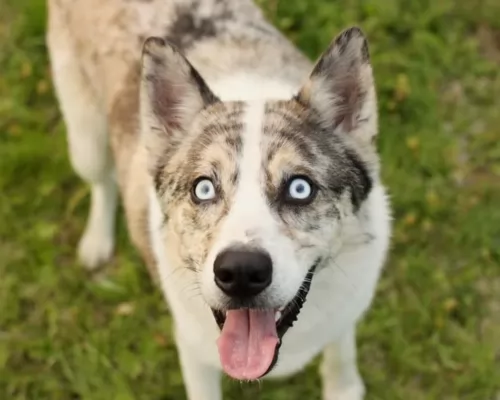 What a beautiful dog the Shepherd Husky is. He is a mix between the Husky and the German Shepherd. Other names for him include Gerberian Shepsky, German Husky and Siberian Shepherd.
What a beautiful dog the Shepherd Husky is. He is a mix between the Husky and the German Shepherd. Other names for him include Gerberian Shepsky, German Husky and Siberian Shepherd.
The German Shepherd originated in Germany and the Husky is from Siberia. We assume this mixed breed dog was bred in the USA. The true origin of the German Shepherd Husky dog is unclear but both the parent breeds have long histories.
The dog is recognized as a Hybrid by both the Dog Registry of America as well as the American canine hybrid Club.
 The Shetland Sheepdog was crossed with working collies and brought to the islands. They were bred on the Shetland Islands, United Kingdom.
The Shetland Sheepdog was crossed with working collies and brought to the islands. They were bred on the Shetland Islands, United Kingdom.
These little dogs have always been particularly valuable to farmers who used them to herd their sheep.
During the early 20th century other crosses occurred an in 1909 and the little dog received recognition by the English Kennel Club. The first Sheltie to be registered by the American Kennel Club was in 1911.
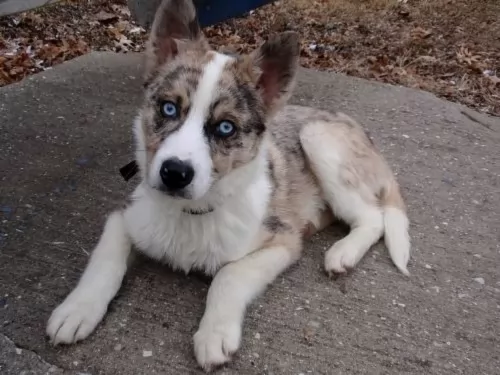 Solid and strong, the German Shepherd Husky mix is attractive. He is a fairly large dog standing at 51 to 64cm in height and weighing between 20 to 40kg.
Solid and strong, the German Shepherd Husky mix is attractive. He is a fairly large dog standing at 51 to 64cm in height and weighing between 20 to 40kg.
They’re powerful dogs these as they have a long history of being working dogs. The eyes of this beautiful dog can be brown, green or blue or a mix of these. The thick double coat protects them from the cold and in the warmer months, he sheds quite a bit.
The coat can be brown, black and tan or it can have creamy shades and be mixed with grey and white too.
The Shepherd Husky is a friendly, amicable dog who wants to please his owner. Training and socialization make him even more well adjusted. He is a dog that will get on well with children in the home as well as other dogs.
He is such an all rounder this dog – loyal, intelligent, social and loving - being great for accompanying you on walks and hikes but being willing to sit with you indoors too.
While he is adaptable and good natured and will happily live with his owner in the city or the countryside, he is better suited to life in the countryside. He also makes a great guard-dog.
 The small Shetland Sheepdog stands at between 33 to 41cm and weighs roughly between 6 and 12kg for both males and females. The long double coat of this dog sheds consistently, he will need to be brushed regularly.
The small Shetland Sheepdog stands at between 33 to 41cm and weighs roughly between 6 and 12kg for both males and females. The long double coat of this dog sheds consistently, he will need to be brushed regularly.
The coat is golden, black or a steel grey color with white. The ears are erect and the tail long and feathery and the expression on this dogs face is sensitive, alert and gentle.
Shelties make wonderful pets for their human families and are great with children too. They’re protective, making good watchdogs. They are somewhat wary around strangers.
Smart and alert, you can train this little dog plenty of tricks because he is quick to learn. They’re such agile little dogs and are great athletes. It’s always a good idea to keep such a smart little dog busy so he doesn’t become bored.
He is able to adjust to life in the city or the countryside, so long as he is kept busy, otherwise he takes to a piercing kind of bark.
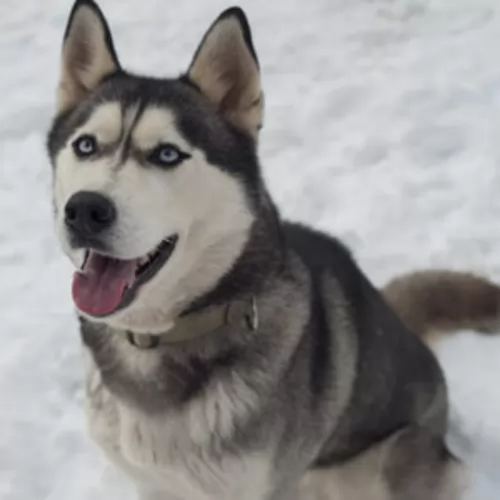 The German Shepherd Husky mix is such an ideal dog for single people, couples and families. This wolf-like breed is intelligent, loving,social and protective – the ideal family dog.
The German Shepherd Husky mix is such an ideal dog for single people, couples and families. This wolf-like breed is intelligent, loving,social and protective – the ideal family dog.
For those looking for an active dog that can be their jogging, walking and camping partner, this dog is for you. He loves to be busy, but he also loves being made a fuss of indoors too.
He has so many excellent qualities and is one dog breed that ticks all the right boxes for being such an all-round splendid pet and companion.
 You’re certainly not going to have one dull moment with the Shetland sheepdog – its such a lively, intelligent, entertaining, playful and also eager to please - that's your Sheltie.
You’re certainly not going to have one dull moment with the Shetland sheepdog – its such a lively, intelligent, entertaining, playful and also eager to please - that's your Sheltie.
They also have a gentle, quiet side. They love the company of their human family and are able to adapt to life in the city or countryside, so long as he gets lots of attention and exercise.
They’re highly strung dogs, and an excitable child can get them barking in a high pitched way which wont be good if you live close to your neighbors.
Shelties are essentially peaceful dogs who prefer a home where its quiet and orderly. If you give this dog what it needs, just like you would for any family member of yours, you’ll be blessed with an awesome pet and companion.
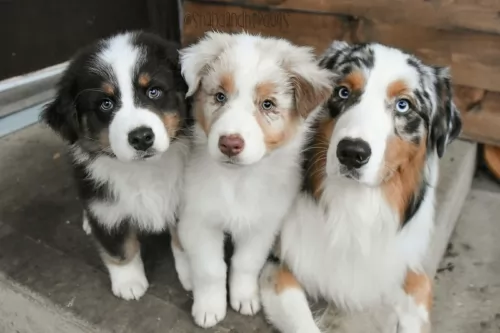 This is such a robust dog that you an scarcely think of him being sickly and yet there are some illnesses that are common to all dogs and which your German Shepherd Husky mix might get as well.
This is such a robust dog that you an scarcely think of him being sickly and yet there are some illnesses that are common to all dogs and which your German Shepherd Husky mix might get as well.
Hip dysplasia is common in German Shepherd dogs as well as arthritis and thyroid dysfunction. Bloat and cancer are other diseases to watch for.
Canine hip dysplasia is a genetic disease characterised as a disease of the hip. The malformation can lead to arthritis and pain and ultimately lead to the loss of hip function, crippling your dog.
You will need to get your pet to the vet for treatment to make his life more comfortable.
 Every dog, no matter how healthy, can succumb to any one of the many dog illnesses there are.Some of the dog illnesses to look out for include cancer, bloat, ear infections, dental problems, hypothyroidism, skin allergies and obesity among others.
Every dog, no matter how healthy, can succumb to any one of the many dog illnesses there are.Some of the dog illnesses to look out for include cancer, bloat, ear infections, dental problems, hypothyroidism, skin allergies and obesity among others.
This illness occurs when the dog’s body doesn’t maintain sufficient levels of thyroid hormones. Your pet will be sensitive to the cold, the thick hair will be thinning and there will be weight gain. It will be wise to have your dog checked out by your vet as this is an ailment which can be managed with medication.
This is an inherited condition that can lead to blindness in some dogs. It can occur in both eyes. It can be diagnosed by your vet but regrettably there is no treatment. Not spaying or neutering your dog will mean that if the have puppies the gene can be carried down to the puppies.
This is an inherited disorder that can cause skin lesions but also affect the muscles. Skin lesions can appear on the head and the front legs and there can be hair loss.
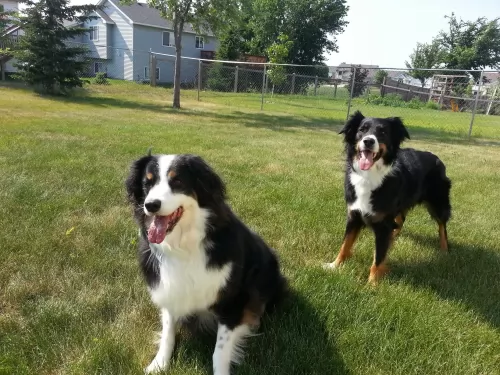 ◆Brush the coat of your Shepherd Husky twice a week to rid the coat of loose hairs. This dog’s hair sheds quite heavily as the weather warms and he may require brushing more often.
◆Brush the coat of your Shepherd Husky twice a week to rid the coat of loose hairs. This dog’s hair sheds quite heavily as the weather warms and he may require brushing more often.
◆When you brush him, check the ears and eyes for infection. The eyes must be bright and clear.
◆Feed your Shepherd Husky the best food there is as he is an energetic, working breed. The commercially manufactured foods can be a good, convenient choice but you need to make sure it is one of the better brands.
Some of the cheaper brands are full of bad ingredients that can make a dog sick.Try and give him some home-made foods that are healthy and nutritious. This food can be added to his dry kibble twice a week.
Boiled chicken, brown rice or pasta and spinach, sweet potatoes and carrots are a tasty healthy choice for your pet. Try and include some raw meat into the diet as well.
 These little dogs have always been farm dogs and they will need a lot of exercise. Even so, with their small size, they can adapt to life in the city or the countryside, but will always need exercise.They love going for walks and playing games with the kids.
These little dogs have always been farm dogs and they will need a lot of exercise. Even so, with their small size, they can adapt to life in the city or the countryside, but will always need exercise.They love going for walks and playing games with the kids.
Your Sheltie will need brushing every day because the hair can so easily pick up leaves, twigs and burrs. In the warmer months some people prefer to trim the coat themselves or take the dog along to a professional groomer.
It is best to feed adult dogs two meals a day instead of one. One can make your dog want to gobble up his food too quickly and this can result in a life threatening condition known as bloat.
How much any adult dog eats will depend on his size, his age and his activity levels.The quality of dog food you buy also makes a huge difference – the better quality the food, the more satisfied your Sheltie will be.
Some of the best commercially manufactured dog foods are convenient and they can be good if you go with the best brands that have high levels of vitamins and minerals in them. Dry kibble can be made more enticing when you add some homemade food into it.
Boiled chicken, sweet potatoes, brown rice or pasta, carrots and spinach will do him the world of good. Chop it up and add small portions to the kibble about twice a week. His wagging tail and prancing antics will be all the thanks you need.
Some raw meat added in occasionally will also contribute to your pet’s heath. Make sure he is never without a constant supply of fresh, cool water.